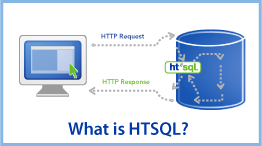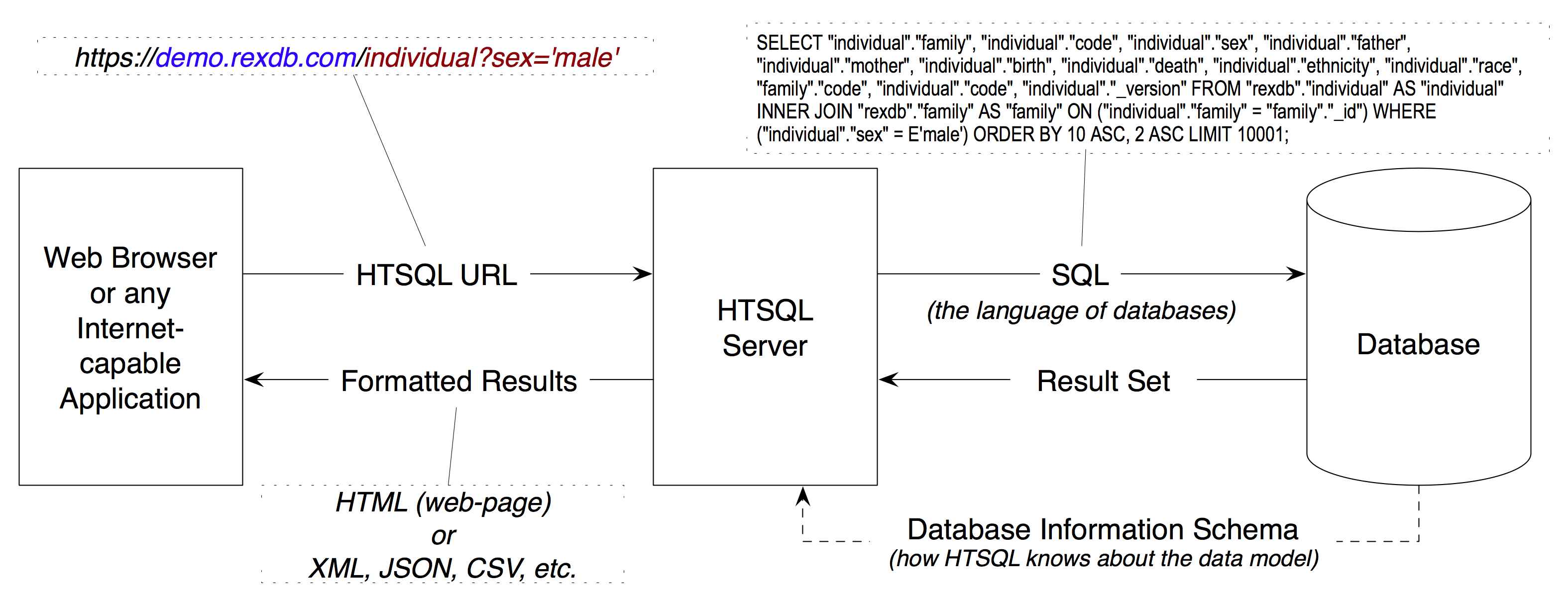HTSQL -- a Query Language for Accidental Programmers
| Presenter: | Clark C. Evans, Prometheus Research |
|---|---|
| Date: | November 3rd, 2010 |
| Location: | PGWest 2010, San Francisco, CA |
HTSQL ("Hyper Text Structured Query Language") is a web-based, high-level query language for relational databases.
Today's Talk
Part I
- Why is querying so hard?
- Who am I? What is HTSQL?
- HTSQL in 10 Minutes
- HTSQL Applications
- Q&A
Part II
- Walk-Through
- Final Q&A
Quite simply, I only need ...
Business user:
"I *just* need a list of schools and the number of departments and programs for each?"
Developer:
"Got it! This one is easy -- give me 15 minutes."
Crickets:
*chrip* *chirp*
it's easy, no?
A junior SQL developer might produce an obvious answer:
SELECT school.name,
count(department),
count(program)
FROM school
LEFT OUTER JOIN department
ON (department.school = school.code)
LEFT OUTER JOIN program
ON (program.school = school.code)
GROUP BY school.name
... that (luckily) also happens to be obviously incorrect.
Perhaps it's not so trivial?
SELECT school.name,
coalesce(correlated_department.count,0),
coalesce(correlated_program.count,0),
FROM school as school
LEFT OUTER JOIN (
SELECT school, COUNT(1) as count
FROM department GROUP BY school
) AS correlated_department
ON (correlated_department.school = school.code)
LEFT OUTER JOIN (
SELECT school, COUNT(1) as count
FROM program GROUP BY school
) AS correlated_program
ON (correlated_program.school = school.code)
But... it should be easy
This business user's request:
"I *just* need a list of schools and the number of departments and programs for each?"
really is trivial. How about an alternative (plot):
/school{name, count(department), count(program)}
This is HTSQL -- a new query language designed from the bottom up to be usable by accidental programmers.
Who am I?
- I'm Clark Evans, principal at Prometheus Research, LLC.
- We serve medical researchers and informatics projects
- Our customers are smart, data-oriented -- not programmers
- Our primary HTSQL users are data analysts
- Kyrylo Simonov is the primary architect of HTSQL
What is HTSQL?
HTSQL is...

- a sophisticated graph-oriented query language
- a web access gateway for relational databases
- a extendible data processing/presentation framework
- a wicked smart tool for smart data heads
- 90% of expressive power, 10% of the complexity
HTSQL Processing Model

a bit more technical
- on startup, introspects table relationships
- relationships are edges in a graph model
- processor translates graph requests into SQL
- handles complex filters, projections and aggregates
- extensive, pluggable support for post-processing
Why did we make it?

We were dealing with users having extremely complex data -- traditional techniques for communication wasn't going to work.
A Shared Language

Our users, analysts, and developers now use a shared query language, while it's not a perfect understanding, it is much better.
Evolution of HTSQL
- started as tool to complement XSLT (2004)
- internal analysts became primary users (2005)
- end users started to use HTSQL directly! (2006)
- complete redesign with lessons learned (2006)
- large deployments, more refinements (2007-2008)
- rewrite for speed, fixing semantic issues (2009)
- porting HTSQL to commercial databases (2010)
Self-Service Reporting
- business analysts are 1st line of inquiry
- end-users sometimes tweak queries!
- dashboard developers use HTML/JQuery + HTSQL
- dba's help with data model changes, views
- system developers do custom commands, transforms
- easy to share (just email!) and format data
Developer Productivity
- queries are easy to grok, use and modify
- accidental join errors are impossible
- complex (impossible?) queries are feasible
- processing framework is extensible
- smaller inbox due to self-service for analysts
- expose VIEWs to HTSQL for 5% problems
HTSQL in 10 Minutes
Let's assume we have a data model, with schools, departments, programs and courses. Here it is:
+-------------+ +--------+
/---m| DEPARTMENT |>-----o| SCHOOL |m----\
|. +-------------+ . +--------+ .|
| . . . |
| department department a school |
| offers may be part has one or |
| courses of school programs |
| |
| +-------------+ +---------+ |
\---<| COURSE | | PROGRAM |>---/
+-------------+ +---------+
#1 - Selecting Data
- curly brackets are selectors
- postfix operators are sorting (+/-)
- use as to rename columns for presentation
An example (E1):
/course{department as 'Dept Code'+, number as 'No.',
credits-, title}
#2 - Linking Data
- we use period to signify a link, or join
- multiple levels of linking is possible
- use curly brackets for nested links
- wildcard * pulls all columns from a table
An example (E2):
/course{department{school.name, name}, * }
#3 - Filtering Data
- the question mark ? indicates filter
- single-quote literal strings
- full predicate algebra
- pluggable function support
For example (E3):
/course{department, number, title}?
credits<3&department.school='ns'
#4 - Aggregating Data
- one-to-many links are "plural"
- all plural links require aggregates
- nested aggregates are possible
An example (E4):
/school{code, avg(department.count(course))}
#5 - Projections & Segments
- projections (^) build new DISTINCT relations
- use / to merge-sort correlated data sets
- currently 1.0 feature only (3-4 months for 2.0)
An example (E5):
/program{degree^, count()}/student
#6 - Pluggable Formatters
- use /:format to specify formatter
- supports CSV, JSON, TXT, HTML
- XML, YAML and others (3-4 months for 2.0)
An example (E6):
/school/:txt
#7 - Table Expressions
- use limit(#, offset) to slice data
- use sort() to sort a table expression
- other forms of table expressions possible
An example (E7):
/department.sort(school).limit(10,5)
Canned .htsql Queries
- web-developers edit .htsql file
- untrusted users use parameterized queries
- uses $var for variable substitution
This permits standard HTML forms:
<form action="/canned.htsql"> Enter an parameter value: <input type="text" name="arg" /> </form>
JQuery / Data Binding
- no server-side programming
- automatic data binding for widgets
- easy dashboard constructions
changes list box makes table auto-update:
<select id="school"
data-source="/school{code, name"} />
<table id="department"
data-source="/department?school=$school" />
Why HTSQL 2.0?
- a full audit of the source and semantics
- our HTSQL 1.0 was not a "community" product
- internal catalog wasn't extensible
- inability to provide custom types/functions
- function behavior varied across databases
- core query implementation was non-streaming
- program API was 4+ years old and it showed
Temporary 2.0 Limitations
- it is in beta and may change
- no custom commands, primitive formatters (yet!)
- no projections or segment queries
- only supports PostgreSQL
- query results are not streaming
- no way to override catalog configuration
Systematic Considerations
- Currently transitioning from 1.0 to 2.0 (beta)
- URL syntax deviates from HTML FORM expectations
- License is BSD + Non-OSI "No Commercial DB"
- Implementation is in Python using Psycopg2.
How do I get it?
- free of charge for PostgreSQL, MySQL, etc.
- open source code, open community
- commercial license for Oracle, Microsoft SQL, etc.
- we'd love to hear from you
There are a few syntax changes (mostly with regard to commands) that we'll be changing in HTSQL 2.0.
Q&A
Please visit our community site, http://htsql.org, our commercial site http://htsql.com, or chat with Clark or Kyrylo here in Ann Arbor. We are best found at #htsql on freenode. We have regular Python releases, with source code at http://bitbucket.org/prometheus/htsql
Generous support for HTSQL was provided by Prometheus Research, LLC and The Simons Foundation. This material is also based upon work supported by the National Science Foundation under Grant #0944460.